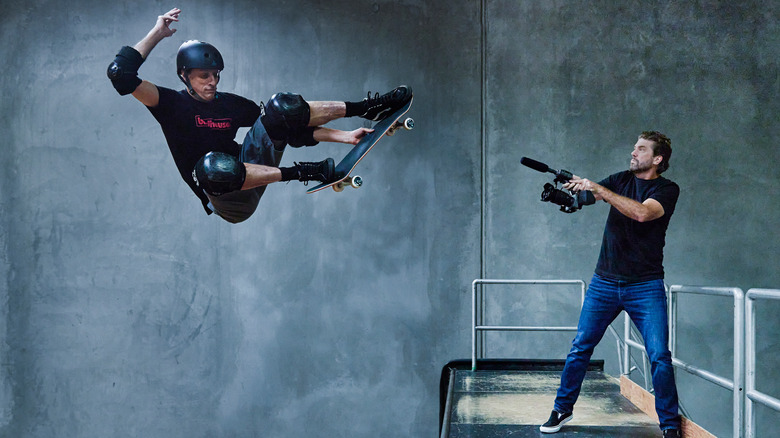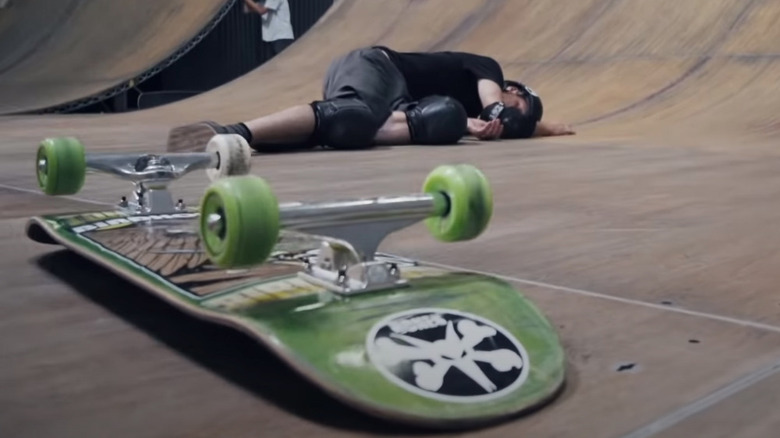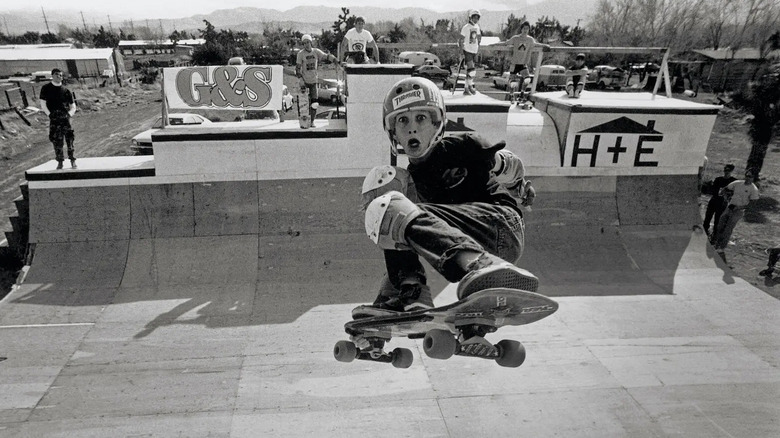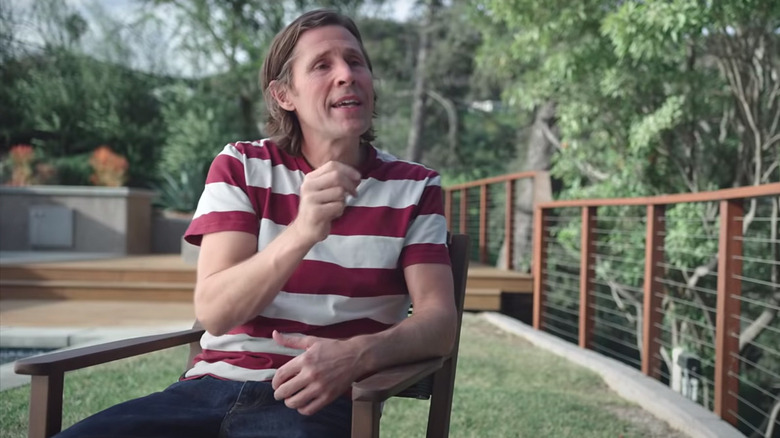Tony Hawk: Until The Wheels Fall Off Director Sam Jones On Finding The Narrative, His Skateboarding Roots & More [Interview]
After premiering at the South by Southwest Film Festival back in March, the new documentary "Tony Hawk: Until the Wheels Fall Off" debuted on HBO last night and is now available to stream on HBO Max. For the film's release, we spoke with director Sam Jones, who you might recognize from the "Off Camera" interview series and podcast featuring in-depth conversations with some of the most well-known figures in pop culture. With a history of skateboarding and impeccable interview skills, you couldn't ask for a better subject to tackle the life and legacy of Tony Hawk, who is considered to be the greatest professional skateboarder of all time. In our interview, we talk about capturing Tony Hawk as he struggles to pull off his most challenging trick, finding the film's story and long-lost footage, and how skateboarding led to the creative career that Jones has now.
'What I wanted to show was how much hard work and how much sacrifice goes into landing those'
I wanted to start off with the opening sequence for this documentary, which is brutal and amazing all at once. How long were you shooting and how long did it take for Tony Hawk to land the 900?
Well, for that sequence, Tony's got a little film division, a couple guys in his office that run 900 Films, and Jared Prindle and Cameron Sanchez were there capturing that. Tony's basic thing is, whenever he is trying a trick, he's filming it, because he may only land it once, especially in the case of some of these harder lip tricks, more technical tricks. That was a case where I think he knew, "Man, the 900, there's a high level of risk and hard trick to make." I think he wanted to see if he could still make another one.
I feel like there was a day before, if I recall correctly, where he's sort of getting the spin a little bit, and then on the day, he just did exactly what Tony Hawk does: He keeps throwing attempts and making little corrections and trying not to break his body up before he lands one. That sequence of footage is so incredible because it really shows how he is able to overcome. He hit his head several times that day, and he definitely took himself beyond his physical capacity, but his mental ability to figure out the calculations and make those little corrections to where he finally lands it, that's the triumph to me.
The reason I opened the film with that, and I think this is more important than the actual circumstances of that trick, if you're someone that doesn't follow Tony Hawk religiously, you're really only going to see his highlight reel and you're going to see him landing tricks. You're going to see compilations of these incredibly difficult tricks. But what I wanted to show was how much hard work and how much sacrifice goes into landing those, how determined he is, not for any money or fame or anything other than mastering a trick and obsessing about something and accomplishing it. That's what drives Tony Hawk. It's not natural talent. There is a desire with Tony to prove to himself on a daily basis, that whatever challenge he comes up with, he's going to stick with it until he does it. That's a beautiful thing about his personality.
So that wasn't specifically shot for the documentary, but he just decided to attempt that trick again, and the video crew captured it.
Well, what we talked about when we started this film was he's got camera people around him all the time. So there's this discussion at the beginning of, "Hey, you're going to be doing this stuff for the film, but your guys are going to be doing it because they're better skate shooters and they're there." So our whole thing was, if you're going to do this, if there's going to be a day where you attempt something, we want all the footage. We don't just want the make or whatever. So that was one of those things.
Gotcha. That footage is incredible, especially that one shot when he falls and the camera just focuses on the skateboard with the wheels still spinning and he's just lying there in the background.
Isn't that amazing?
Yeah.
I know. From just a purely geek out skateboarding perspective, those bearings are so good. At that time, Tony was still putting these ceramic bearings in from Powell, I think they're $120 a set, but he gives away so many of his boards that he stopped riding those particular bearings. But they spin forever. They're like perpetual motion machines or something. Crazy.
'I sort of credit skateboarding for me becoming a creative person that didn't have to have a real job'
What was your relationship with skateboarding like before this movie then? Were you ever a skateboarder yourself? Was it just something that you were interested in?
Oh, I was a serious skateboarder, and I still skate. At the time of those early contests that are all in the movie, I was competing at the same time. I was in CASL, which is the California Amateur Skateboard League, and we would have our events usually the day before the NSA [National Skateboard Association] events. I never quite made it to the pro level. I made it to the shop-sponsored amateur level. But I would go around and compete at these contests at Delmar and Upland and whatever skate parks were left at that time.
I loved it. It was my life. It was where I found myself confidence in my community. It's how I learned to be sort of an individualist or a free thinker. I sort of credit skateboarding for me becoming a creative person that didn't have to have a real job, because that's sort of what skating taught you. Get up every morning and try to get away with it. If you love something, and you can figure out a way to do every day, then you're already successful. It was never about making money. It was never about being successful on anybody else's terms. It was just that we woke up and we loved skating and playing music and drawing and making little magazines and stuff like that. So yeah, skateboarding formed the foundation of all of that for me. I'm actually in the movie. I'm in the crowd at the Upland contest.
Oh, that's great.
Yeah.
What's the process like for putting together such a comprehensive documentary like this? Does Tony Hawk just hand over a box of tapes and hard drives and you and your crew are poring over them? Do you let the story form as you find footage? Are you finding the narrative in the interviews and then getting footage to match it?
Well, I'm not the kind of documentarian that outlines their film first and then goes out and makes it. I'm just the opposite. I'm sort of discovery-based. I wish it were that easy, that Tony had a box and that was all of the video evidence of his life. But the truth is this stuff is scattered around all over the place. Tracking down footage, some of the stuff became like white whale-level searches. That first contest where he skates against Duane Peters, that was filmed by a local amateur skater's father. The original tape was lost. It took us forever to finally track down a copy of that.
Wow.
There was a skateboarder that shot Mike McGill's first McTwist. He lived in Colorado, and it was on Super 8, and he had never processed the film. So we got that from him. But for me, I like to go out and speak to everybody as close to Tony Hawk as possible and keep that really small cast of people who are really there at the important parts of his life. By having all those conversations and hours and hours and hours of interviews with Tony and all these other skaters, the narrative sort of emerges in my head.
Then I sit down with the editor and we talk about all the things I don't want it to be and how I want the audience to perceive this story and how to accomplish that. So we went through a lot of exploration. At one point, we divided our footage into tone poems and narrative — what's the word I'm looking for — sort of exposition in ways that we can move the story along, but also try to give the audience an idea of what it feels like to skate. Through those explorations, we sort of found a film that I didn't want it to be a genre film, but I wanted it to be as interesting for non-skaters as it would be to skaters.
When you make a film, you sort of have to think about the first impression it makes and what you start with, and then you establish your own language of what you're able to do. Hopefully, if you have a great editor, and we had a great editor, you can build on that plan. Then more towards the end of the process, I would go back, and I would try to get more specific about certain things that emerged as part of the narrative. I could go back and ask Tony about that. But for me, the joy was in the exploration for sure.
'I feel like he was someone that understood how to communicate the feeling and the complexity of how our identity is wrapped up in the things we love to do'
Is there was a moment that really sticks out in your mind where you felt like you had discovered something that you knew would help define the film?
Yeah, some of this footage that Stacy photographed, but it never got put into Bones Brigade videos. Like, when we found the 16-minute interview with [Tony Hawk's] father, that was a huge moment, because there's very little footage of Frank Hawk. It helped in trying to piece together his story and the nuances of him being sort of a distant dad emotionally, but a very active dad in terms of showing up and supporting his son. It allowed us to tell that story and still not whitewash it, but really make a story about a man who was complicated and his relationship was complicated. Then we use that as a way to show how, as a kid, you have to make your own path, and you have to find your own way. Being a parent myself, every time we came across something that would strengthen the narrative, certain things that I really wanted to express, like the father-son story, that would be really exciting for me.
How much time did you spend with Rodney Mullen (seen above)? I feel like he's one of the standout talking heads, and you could just talk to him for hours and listen to every insightful thing he has to say.
Yeah, it was interesting, because I actually did some — not pre-interviews, but I had some long conversations with him before we started, too. In a way, I'm trying to establish trust before we're on camera. So that by the time he shows up, he knows, A): I understand skateboarding and was around then, and B): the story I want to tell. He has a sense of where he fits into that story.
With Rodney, I had so much admiration for him. I was of the era where you kind of skated everything. So I skated vert, I skated street, and I skated freestyle. I won a freestyle contest doing one of Rodney's signature tricks that I learned from one of his videos. That was sort of the icebreaker for me to talk about that. So by the time he came to be interviewed, I was able to get to the heart of my questions.
I feel like he was someone that understood how to communicate the feeling and the complexity of how our identity is wrapped up in the things we love to do. As you start incorporating characters into your film, you realize how to focus their message, and with Rodney, I really feel like he could often describe — better than Tony could — Tony's motivations and Tony's challenges.
I feel like we got really lucky with Stacy Peralta and Rodney Mullen and Lance Mountain in that we have these skaters that are such unique speakers and such unique thinkers, that they really were able to express what it was like to be there and what it felt like to go through that history in a way that you often don't get in a documentary. These are people that have lived independent lives. They've never had real jobs. They've never had to conform, and it makes for interesting conversation.
Yeah, they say some really beautiful things. To switch gears at the end here, you directed the formula-breaking "Ted Lasso" season 2 episode "Beard After Hours." I was wondering if there was a chance we might get another episode like that in season 3, if you were possibly taking reins of another episode for the third season?
I'm not doing an episode of "Ted Lasso" next season. I'm going to go off and do another Apple show that's super exciting to me. But the "Ted Lasso" experience was amazing. I was such a fan of that show. So to be able to go over there and do it during the pandemic, it was almost impossible to make that happen. They filmed that show entirely in London, and it's mostly locals that directed. So for me to get an opportunity to do that, because Jason [Sudeikis] was a fan of my work, was such a great thing to do. I do know that Jason, from the start, has plotted out that show. Before they even filmed the pilot, he had the third season all in his mind. But I'm like you, I'm just as excited to see what happens next.
"Tony Hawk: Until the Wheels Fall Off" is streaming now on HBO Max, and "Ted Lasso" has two seasons available on Apple TV+ with the third season on the way.



